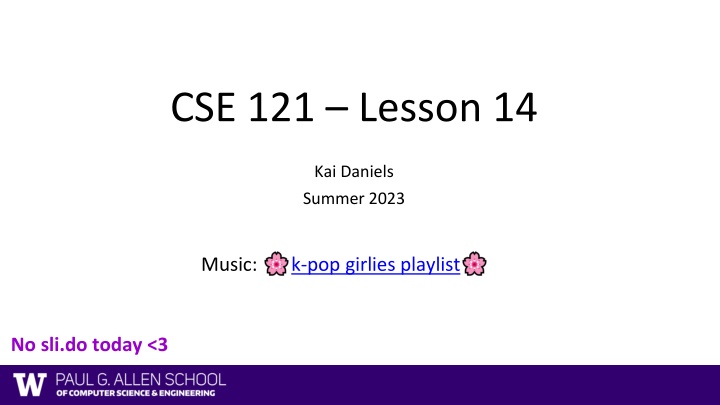
Computational Thinking and Array Patterns in Java Programming
Explore the concepts of computational thinking, array manipulation, and Java programming through practical examples and learning objectives. Get ready for the final exam, announcements, and reminders in your CSE 121 Lesson 14 class. Enhance your coding skills and problem-solving techniques with hands-on practice and evaluations.
Download Presentation

Please find below an Image/Link to download the presentation.
The content on the website is provided AS IS for your information and personal use only. It may not be sold, licensed, or shared on other websites without obtaining consent from the author. If you encounter any issues during the download, it is possible that the publisher has removed the file from their server.
You are allowed to download the files provided on this website for personal or commercial use, subject to the condition that they are used lawfully. All files are the property of their respective owners.
The content on the website is provided AS IS for your information and personal use only. It may not be sold, licensed, or shared on other websites without obtaining consent from the author.
E N D
Presentation Transcript
CSE 121 Lesson 14 Kai Daniels Summer 2023 Music: k-pop girlies playlist No sli.do today <3
Announcements, Reminders Creative Project 3 Practice Final released, due next Tuesday Resub 5 due tomorrow, Resub 6 (final resub) out tomorrow Course Evaluations open Aug 12th Aug 18th https://uw.iasystem.org/survey/277506 Reminder: Final exam Wednesday Aug 16 4:30 6:30 PM in PAA A102 See Final Exam page for the procedures and seating Assignments Friday Lecture is Final Review Session 2
(PCM) Looking at Multiple Elements in an Array 0 1 9 1 0 public static boolean isPalindrome(int[] list) { for (int i = 0; i < list.length / 2; i++) { if (list[i] != list[list.length - 1 - i]) { return ; } } return ; } 3
(PCM) Looking at Multiple Elements in an Array 0 1 9 1 0 public static boolean isPalindrome(int[] list) { for (int i = 0; i < list.length / 2; i++) { if (list[i] != list[list.length - 1 - i]) { return false; } } return true; } 4
(PCM) Array of Counters or "Tallying" 8 3 0 1 2 2 0 7 2 public static int[] numCount(Scanner input) { int[] counts = ; while (input.hasNextInt()) { int num = input.nextInt(); } return counts; } 5
(PCM) Array of Counters or "Tallying" 8 3 0 1 2 2 0 7 2 public static int[] numCount(Scanner input) { int[] counts = new int[10]; while (input.hasNextInt()) { int num = input.nextInt(); counts[num]++; } return counts; } 6
(PCM) Common Ideas in Array Patterns Loop bounds Direction of traversal Indexing into an array 7
Final exam To C3 and the website! 8
Learning Objectives or, What did I learn in this class? 1.Computational Thinking Create an algorithm to solve a given problem and express that algorithm in a structured way (e.g. pseudocode) 2.Comprehension Trace and predict the behavior of programs and systems 3.Code Writing Write functionally correct Java programs that meet a provided specification using control structures, primitive data types, and basic data abstractions 4.Communication Clearly and effectively describe the behavior of a given code snippet 5.Debugging Identify errors in a method s behavior & implement fixes for identified errors 6.Decomposition Solve problems by breaking them into subproblems and recombining the solutions using techniques such as methods 7.Ethics/Impact Describe ethical and sociotechnical issues related to software and technology and explain how their choices as programmers can impact those issues 9
Thank you! This is still a very new course! We are always looking for feedback on how to improve the class for you and for future students! Thank you for your patience and understanding as we continue to improve these new assignments, resources, and examples. We really value your feedback! Let us know what is or isn't working for you! Something that went well in another course? Tell us about it! Please fill out course evals by August 18th at 11:59pm to provide feedback about the course! 10
Course Overview Future Courses or What can I do next? CSE 122 Introduction to Computer Programming II CSE 123 Introduction to Computer Programming III Non-majors Majors Course Overview Course Overview CSE 311 Mathematical foundations CSE 154 Intro. to web programming (several languages) CSE 351 Low-level computer organization/abstraction Software design/implementation CSE 163 Intermediate programming, data analysis (Python) Introduction to data science (Python) CSE 331 CSE 180 CSE 341 Programming languages CSE 373 Data structures and algorithms (non-majors) CSE 340 Interaction programming CSE 374 Low-level programming and tools (C/C++) CSE 416 Intro. to Machine Learning Other tech-related majors: Informatics, ACMS, Electrical & Computer Engineering, See: https://www.cs.washington.edu/academics/ugrad/current-students and https://www.cs.washington.edu/academics/ugrad/nonmajor-options/nonmajor-courses 11
Applications of CS or What can I do with what I learned? Detect and prevent toxicity online Digitize basketball players Help DHH people identify sounds Figure out how to best distribute relief funds Recognize disinformation online Make movies Improve digital collaboration Fix Olympic badminton & Identintify cheating in chess And so much more! 12
Frequently Asked Questions How can I get better at programming? Practice! How can I learn to X? Search online, read books, look at examples :) What should I work on next? Anything you can think of! (Here are some ideas) Beware: it s hard to tell what s easy and what s hard. Should I learn another language? Which one? That depends what do you want to do? What s the best programming language? (take CSE 341 or CSE 413) 13
